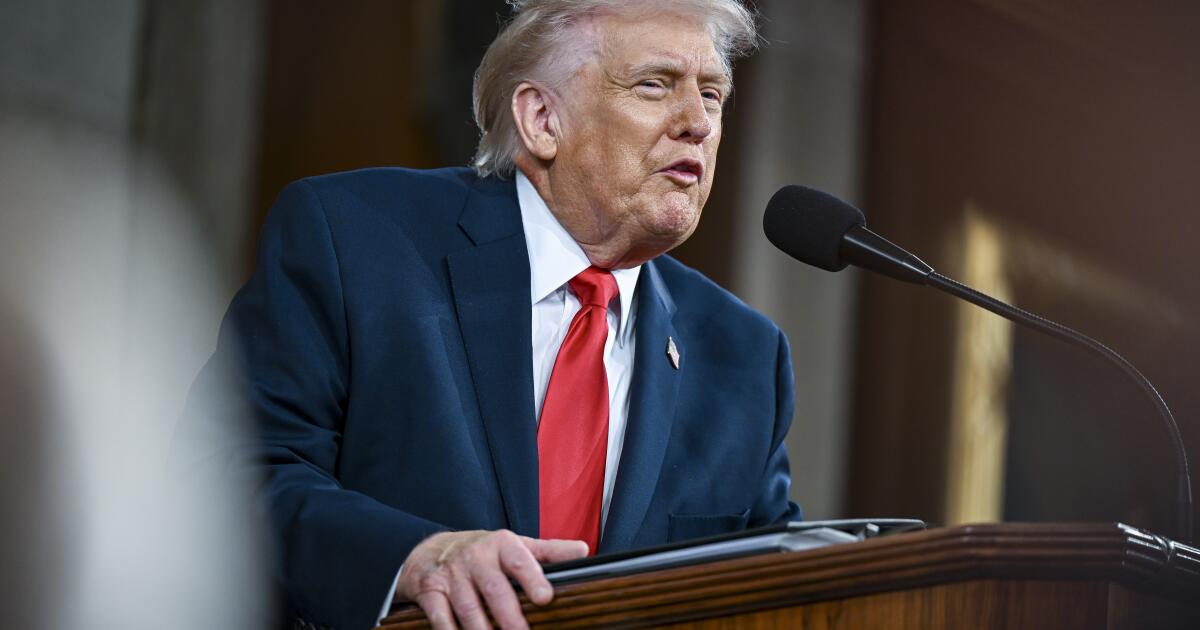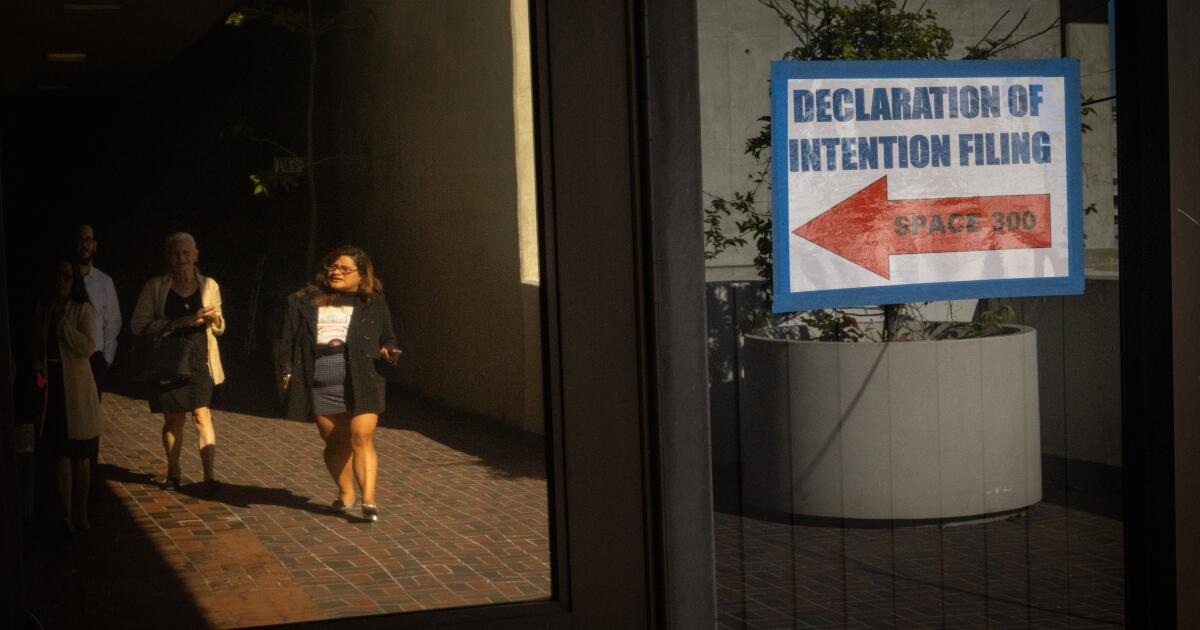Column: Trump’s address to Congress trumpets how he usurps Congress
For this year’s State of the Union address, as usual, the president was the center of attention. That’s just where Donald Trump lives, so it’s no wonder that he broke his record for the length of the nationally televised speech. He was the star of his own unreality show, with an audience of tens of millions. In front of him, idolatrous Republican lawmakers popped up and down to applaud like clowns in wind-up music boxes of old.
In fact, a president comes to the Capitol as a guest in Congress’ home, there only by invitation of the speaker of the House. It’s a historical nod to the separation of powers so essential to America’s system of government. But of course Trump acts as though he owns the place. And why not? The Republican majorities in the House and Senate essentially gave him the keys and title, along with much of their constitutional power over spending, federal appointments, war powers and more.
“What a difference a president makes,” a triumphalist Trump imperiously marveled about himself on Tuesday night, after exaggerating or falsely claiming his achievements of the past year.
Got that? Even with a Congress controlled by his party, with its majorities at risk in this midterm election year because of his unpopularity, Trump couldn’t find it within his narcissistic self to share the specious credit. Then again, he does act alone most of the time, and polls show he’s getting blame, not credit, from 6 out of 10 Americans.
For the good of the nation, Congress must take back its powers from Trump and, with them, more of Americans’ attention. No less than Supreme Court Justice Neil M. Gorsuch, a Trump appointee, pleaded as much just days before the State of the Union address.
In concurring with the Court’s 6-3 ruling last week striking down the centerpiece of Trump’s agenda — unilateral tariffs — as a usurpation of Congress’ constitutional taxing power, Gorsuch all but implored lawmakers to restore Congress’ intended role as a co-equal branch of government — and the president to respect it as such. (Spoiler: He won’t.)
Gorsuch’s opinion was a masterclass in why the founders created Congress in the very first article of the Constitution, saving the presidency and the judiciary for the second and third articles. I don’t agree with Gorsuch on much, but his concurrence should be required reading for Trump and for members of Congress who plainly need remedial civics lessons. It’s worth quoting at length; italics are mine.
“Our founders understood that men are not angels, and we disregard that insight at our peril when we allow the few (or the one) to aggrandize their power based on loose or uncertain authority,” Gorsuch wrote.
“Yes, legislating can be hard and take time,” he closed. “And, yes, it can be tempting to bypass Congress when some pressing problem arises. But the deliberative nature of the legislative process was the whole point of its design. Through that process, the Nation can tap the combined wisdom of the people’s elected representatives, not just that of one faction or man. There, deliberation tempers impulse, and compromise hammers disagreements into workable solutions. And because laws must earn such broad support to survive the legislative process, they tend to endure, allowing ordinary people to plan their lives in ways they cannot when the rules shift from day to day. In all, the legislative process helps ensure each of us has a stake in the laws that govern us and in the Nation’s future.”
Do you know what won’t endure? Trump’s policymaking by “impulse” and fiat, by hundreds of executive orders. Indeed, it would be in his interest to work with Congress on laws that will outlive him and stand as his legacy. Yet he wants to be a king, getting quick results on a whim, by the thumbing of a tweet or a Sharpie signature on paper. Legislating requires time, compromise and ultimately sharing credit.
Perhaps that’s why Trump is so intent on erecting edifices of tangible marble and gold in Washington and beyond: Those will endure when his policies don’t. And that’s the legacy he craves — mega-ballrooms, arches, statues, busts and buildings in his name and image.
Gorsuch wasn’t in the House chamber to hear Trump’s address and his slap at the court’s tariff decision. Just four of the nine justices were, including Chief Justice John G. Roberts Jr., who wrote the main opinion, and two other justices who’d joined in opposing Trump’s tariff power grab. The president insisted he’d proceed with unilateral tariffs under separate laws, adding that “congressional action will not be necessary.” Republican lawmakers applauded.
The founders, in the Constitution, required presidents to annually report on the state of the union and to “recommend” to Congress “such Measures as he shall judge necessary and expedient.” Then it’s the president’s job to “take Care that the Laws be faithfully executed.” Yet as usual, Trump outlined little in the way of a legislative agenda.
The president likes to note, as he did in his address, that he’ll preside over this year’s celebrations of the nation’s 250th birthday. But he should know that the nation wasn’t born in a day, on July 4, 1776. The founders squabbled 11 years more over the Constitution, and states took another two years to ratify it.
Yes, democracy has been hard from the start. That’s why Trump’s appeal for some Americans is his action-figure persona — forget norms, laws and the Constitution.
But perhaps if Trump’s poll numbers remain in the tank, even Republicans in Congress will summon the guts to protect the institution’s powers. And if they don’t, that’s all the more reason for voters to turn the keys over to Democrats in November.
Bluesky: @jackiecalmes
Threads: @jkcalmes
X: @jackiekcalmes

